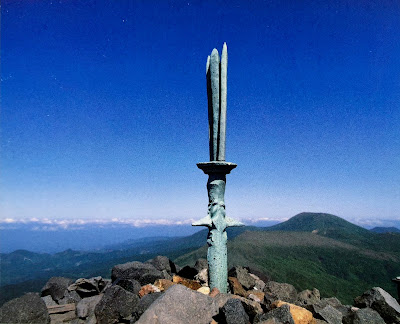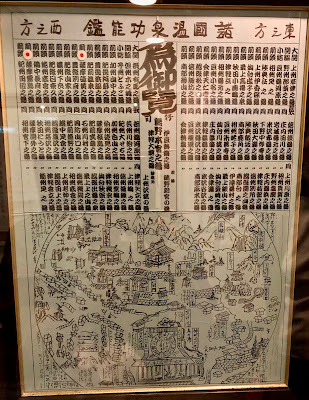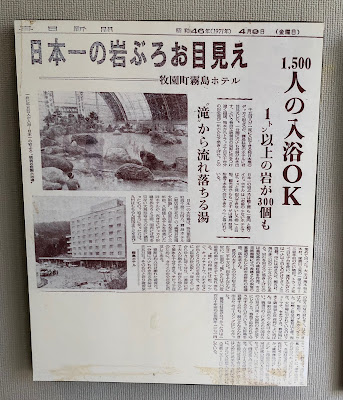 |
| '硫黄谷温泉 ・霧島ホテル' 公式サイト : ★ 9月26日 ~ 10月1日、私と姉Yは、鹿児島県へ旅行しました。 9月29日から10月1日、2泊3日、 霧島温泉郷 (キリシマオンセンキョウ) にある '硫黄谷温泉 ・霧島ホテル' に滞在しました。 このセクションは、展示についてです。 温泉についてはこちら→★'Iō-dani Onsen・Kirishima Hotel' Official Website : ★ From 26th of September to 1st of October I and my sister Y travelled to Kagoshima Prefecture. From 29th of September to 1st of October, we stayed in the 'Iō-dani Onsen・Kirishima Hotel' in Kirishima Hot Springs Village for two nights and three days. This section is about the Exhibits. About their Hot Spring →★ 画像は下記より / This from below ★ |
目次 / Contents
1) 霧島山六女仙 / Six Female Hermits of Kirishima Mountains
2) 司馬遼太郎の手紙 / Letter From Ryōtarō Shiba
3) ハガキ、パンフレット、写真 / Postcards, Leaflets and Photographs
A. 絵葉書 / Picture Postcards
B. 温泉 / Hot Spring
C. 印刷物 / Prints
4) 工芸品 / Craft
A. 彫金 / Engraving
B. 錫器、その他 / Tinware and Others
5) 宿泊客 / Guests
A. 椋鳩十 / Hatojyu Muku
B. 与謝野夫婦 / Yosano Couple
C. 坂本龍馬 / Sakamoto Ryōma
6) 最後に / Lastly
1) 霧島山六女仙
Six Female Hermits of Kirishima Mountains
霧島ホテルには、地域に関連する展示物がたくさんあります。
その中で最も興味があったのは、坂本龍馬 (1836 - 1867) に関するものでした。
つぎに興味があったのは、'霧島山六女仙' (キリシマ ロク ニョセン) でした。
本の2ページのみの展示であり、文章も古い形式なので、完璧に理解はできません。
また、物語の場面と思われる絵画も3枚のみで、物語の全容を知ることはできません。
ページの冒頭に、
'霧島山女仙'は何人 (ナンビト) たることを詳 (ツマビラカ) にせず。'
とあり、もともと、明確にはされていません。
展示ページから、私が理解したのは、下記です。
"昭和7年 (1932年) 生まれの善五郎は、15歳の時から、霧島山の幽界 (ユウカイ) に住む女仙達に26年雇われ、その後、帰宅します。
善五郎によって、女仙達の存在が世に知られることになりました。"
展示ページ後の物語は、国会図書館データー: ★で読むことができます。
(私の理解では、17,18歳に見える六女仙は、皆、髪が長く、清らかで、見分けがつかず、誰が主人なのかもわかりません。
善五郎は勤めている間、六女仙の世界と、人間界を複数回行き来しています。)
私はある程度は物語を理解したとは思いますが、私には古い形式の文章を読みこなすことができないので、私の理解が正しいのか、今もってわかりません。
'霧島山六女仙'は、私が想像していたよりも、最近の伝説でした。
天孫降臨については下記のセクションに書いています。
 |
| 展示ページ / Display Page P.138 国会図書館データー : ★  展示ページ / Display Page P.139 |
Six Female Hermits of Kirishima Mountains
The Kirishima Hotel has many exhibits related to the region.
The next thing I was interested in was 'Kirishima Roku Nyosen : Six Female Hermits of Kirishima Mountains'.
It's only a two-page display of the book, and the text is in an old format, so I can't fully understand it.
In addition, there are only three paintings that seem to be the scene of the story, and it is not possible to know the whole story.
From the top of the page, originally, it was not made clear.
'Six Female Hermits of Kirishima Mountains do not specify who they are.'
From the display pages, what I understood is the following.
"Zengoro, who was born in 1932, was employed by the Six living in the different world (God World) : Yukai of Mountains for 26 years from the age of 15, and then returned home.
Thanks to Zengoro, the existence of female immortals became known to the world. "
The story after the display pages can be read in the National Diet Library data : ★ in Japanese.
(In my understanding, the Six, who appear to be 17 or 18 years old, are all long-haired, pure, almost identical, and he does not know which one is a master.
While working, Zengoro goes back and forth between the world of Six Immortals and the human world multiple times.)
I think I understand the story to some extent, but I can't read old-style writing, so I'm still not sure if my understanding is correct.
'Kirishima Roku Nyosen : Six Female Hermits of Kirishima Mountains' is a more recent legend than I had imagined.
On a side note, it is said that Ninigi no Mikoto descended on Mt. Takachiho-no-Mine, one of the Kirishima Mountains, the same mountain as the Tenson-kōrin descent.
If you want to know Tenson-kōrin, please click here→★ or this section :
 |
| 'Kirishima Roku Nyosen : Six Female Hermits of Kirishima Mountains' By a modern nishiki-e artist, Nanshu Hokuto (1946 ~)  北斗 南舟 (ホクトナンシュウ/1946~) 氏は、 現代錦絵画家 (ゲンダイニシキエガカ)です。  北斗 南舟氏の '霧島山の幽界'は、 雲の上にあることがわかります。 I can see that Nanshu Hokuto's 'The Different World of Mt. Kirishima' is above the clouds.  |
2) 司馬遼太郎の手紙
Letter From Ryōtarō Shiba
司馬 遼太郎 (シバ リョウタロウ / 1923 - 1996) が、若い世代に向けて手紙を書き、その手紙が展示されています。
おそらく彼がこのホテルに宿泊した時に、その手紙が書かれ、それが展示していると推測します。
司馬 遼太郎はたくさんの作品を書いていますが、私は1作も読んでいないことに気がつきました。
何も読んでいなくとも彼の名前は知っています。
彼の小説が原作として、たくさんのドラマや映画になっているので、それらのいくつかは見ていると思います。
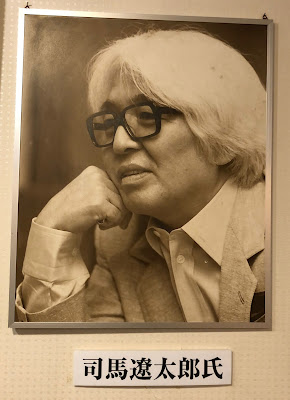 |
| Ryōtarō Shiba (1923 - 1996) |
Letter From Ryōtarō Shiba
Ryōtarō Shiba (1923 - 1996) wrote a letter to the younger generation, and the letter is on display.
I presume that the letter was written when he stayed in this hotel, and so it is on display.
Ryōtarō Shiba wrote many works, but I realized that I haven't read any of them.
Even though I haven't read anything, I know his name.
His novels have been turned into many dramas and films, so I think I've seen some of them.
 |
| 若者へ宛てた手紙 手紙から、まっすぐな、素直な気持ちが感じられ、 彼の精神が若々しいと思いました。 Letter to Young People From his letter, I could feel his straight feeling and sincerity, and I thought his spirit was youthful. |
3) ハガキ、パンフレット、写真
Postcards, Leaflets and Photographs
昔の絵葉書や案内の冊子を見るのは、楽しかったです。
It was fun to look at old postcards and guide leaflets.
A. 絵葉書 / Picture Postcards
 They say, |
| 'The photographs on display are enlargements of postcards sold at our hotel.' |
 |
| 天の逆鉾 : 天逆鉾 天逆鉾 (アメノサカホコ) は、日本の中世神話に登場する矛です。 天逆鉾が、大国主神 (オオクニヌシノカミ)を通して 瓊瓊杵尊に譲り渡されて(国譲り) 、国家平定に役立てられ、 その後、国家の安定を願い矛が二度と 振るわれることのないようにとの願いをこめて 高千穂峰に突き立てたという伝承があります。 Ameno-saka-hoko Ameno-saka-hoko is a kind of halberd (hoko) which appears in the myths of medieval Japan. One of Legends has it that the Ameno-saka-hoko was handed over to Ninigi through Ōkuninushi God (kuni-yuzuri ) and was used to pacify the nation, after which it was thrust, upside down, into Mt.Takachiho with the hope that the halberd would never be wielded again, wishing for the stability of the nation. |
 |
| 高千穂峰初詣 Takachiho Peak New Year's Visit |
 |
| 1949 |
 |
| 霧島館, 1951 Kirishima-kan, 1951 |
 |
| 丸尾滝 台風の影響で丸尾滝 (マルオノタキ) への道が交通留めで、 私達は見ることができませんでした。 Maruo Falls We couldn't see the Falls because the road to Maruo Falls was closed due to the typhoon. |
 |
| トラックで花見 Cherry Blossom Viewing on a Lorry |
 |
| 硫黄谷の霧島タクシー Kirishima Taxies in Iō-dani |
 |
| 大浪池のエンジンつき舟. 1931 大浪池 (オオナミノイケ)は、霧島山にある 直径630m、周囲約2km、ほぼ円形の火口湖 (カコウコ)です。 4万年前の霧島山の爆発によって山頂の土砂が吹き飛ばされ、 火口に水が溜まり、できた湖です。 常時水がある火口湖としては日本で一番高い処にあります。 水面の標高は、1241m。 龍神が住むといわれ、龍神伝説もあります。 Boat with an Engine at Onami Pond.1931 Onami Pond (Onami-no-ike) is a nearly circular crater lake with a diameter of 630m and a circumference of about 2km in Kirishima Mountains. The lake was formed when the earth and sand at the summit were blown away by the explosion of Kirishima Mountains 40,000 years ago, and water accumulated in the crater. The altitude of the water surface is 1241m. It is said that a dragon God lives here, and there is also a Dragon God legend. |
下記の伝説は、Wikiより
"近くの村に子供のいない夫婦がおり、山の神に祈ったところ女の子を授かり「お浪」と名付けた。
美人であったため18歳になったとき結婚の申し込みをいくつも受けたが断り続けた。
ある夜、彼女は山の池に飛び込み実は竜神の化身だったというもので、「お浪の池」がやがて「大浪の池」と呼ばれるようになったといわれる。"
The legend below is from Japanese Wiki
(Translated by me)
"There was a childless couple in a nearby village, and when they prayed to the Mountain God, they had a girl and named her 'Onami'.
She was so beautiful that when she turned 18, she received several offers of marriage, but she kept turning them down.
One night, she jumped into a pond in the mountain and was actually an incarnation of the Dragon God. "
B. 温泉 / Hot Spring
 |
| 庭園大浴場 (イメージ画) Garden Bath (Image drawing) |
4) 工芸品 / Craft
A. 彫金 / Engraving
 |
| 帖佐 美行 (チョウサヨシユキ/ 1915 - 2002)は、 彫金家、文化勲章受章者です。 Yoshiyuki Chosa (1915 - 2002) was a metal engraver and recipient of the Order of Culture. |
 |
| 薩摩錫器 薩摩錫器 (サツマスズキ) が有名であることは、 この旅行のリサーチ中に知りました。 薩摩切子 (サツマキリコ) のお店には行きましたが、 錫器のお店には行きませんでした。 ホテルでは、使用されていた薩摩切子も、 薩摩切子の展示も見かけませんでした。 Satsuma Tinware During my research for this trip, I learned that Satsuma Tinware is famous. I went to a Satsuma Kiriko shop, but not a tinware shop. Satsuma Kiriko is a style of cut glass, now a traditional Japanese craft. In the hotel, I didn't see any use, or display, of Satsuma Kiriko.  |
薩摩切子の店については、下記。
About Satsuma Kiriko, below.
 |
| 霧島ビードロ(ガラス) 切子ではないけれど、ビードロ (吹きガラス) は 展示されていました。 Kirishima Glass Though not cut glass, vidro (blown glass) is on display. |
 |
| 硫黄谷焼 鉄泉と粘土使用の硫黄谷焼。 Iō-dani Pottery Iō-dani ware using iron spring and clay |
 |
| 硫黄谷焼 猿田彦 (サルタヒコ)の面だと思います。 Iō-dani Pottery I think this is a mask of Sarutahiko. |
実際の歴史や場所については諸説ありますが、葦原中国の場所が
高千穂峰 (タカシホノミネ) であったとの説がこの地域では用いられているようでした。
Sarutahiko is said to have guided Ninigi no Mikoto and his party to Ashihara no Nakatsukuni during Tenson-kōrin.
There are various theories about the actual history and location, but it seems that locally the theory is that the location of Ashihara no Nakatsukuni was Mt. Takachiho-no-Mine (one of the Kirishima Mountains).
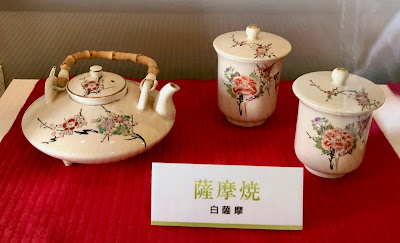 |
| 薩摩焼 鹿児島に来てから、薩摩焼には、 白もん(白薩摩)と黒もん(黒薩摩)があると知りました。 白もんは、藩主向けの御用窯で制作されていました。 Satsuma Ware After coming to Kagoshima, I learned that there are two types of Satsuma ware : Shiro-mon (white Satsuma) and Kuro-mon (black Satsuma). Shiro-mon was produced in the official kiln for the feudal lord. |
 |
| 黒薩摩焼 / Black Satsuma |
5) 宿泊客 / Guests
A. 椋鳩十 / Hatojyu Muku
 |
| 俳句 作 : 椋 鳩十 (ムク ハトジュウ / 1905 - 1987) 教員でした。 幼い頃に、彼の作品はいくつか読んでいます。Haiku By Htojyu Muku (1905 - 1987) Haiku is a type of short form poetry originally from Japan. Htojyu Muku was a Japanese novelist, author of children's literature, director of the Kagoshima Prefectural Library, and teacher. He is a representative figure of animal literature in Japan. I read some of his works when I was little.  "When Htojyu Muku stayed in our Hotel and walked in the '100 Years Cedar Garden', he made this Haiku." |
 |
| '100年杉庭園' 入り口 椋鳩十の歌碑は、'100年杉庭園' 入り口に 設置されています。 Entrance, 100 Year Old Cedar Garden Muku Hatoju's monument is installed at the entrance of '100 Years Old Cedar Garden'. |
'100年杉庭園' については下記。
About '100 Years Old Cedar Garden', below.
B. 与謝野夫婦 / Yosano Couple
 |
| 与謝野鉄幹・晶子夫妻 与謝 野鉄幹 (ヨサノテッカン / 1873 - 1935) と 与謝野 晶子 (ヨサノアキコ / 1878 - 1942)、 双方の詩が、'100年杉庭園' に配置されていました。 Tekkan and Akiko Yosano Poems by Tekkan Yosano (1873 - 1935) and Akiko Yosano (1878 - 1942) are placed in the '100 Years Old Cedar Garden'. |
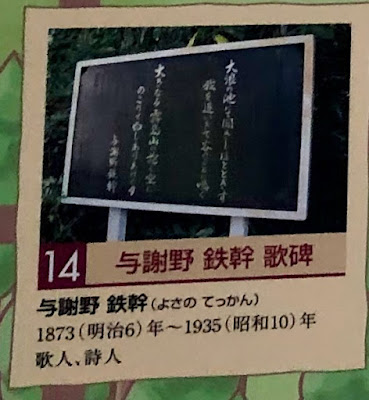 |
| 画像は、'100年杉庭園' の地図から The image is from the map of the '100 Years Old Cedar Garden'. |
 |
| 画像は、'100年杉庭園' の地図から The image is from the map of the '100 Years Old Cedar Garden'. |
 |
| 与謝野晶子、竹駕籠 (タケカゴ) で大浪池へ Akiko Yosano goes to Onami Pond by a bamboo Kago. |
坂本龍馬 (1836 - 1867) と
彼らの新婚旅行については、すでにブログにあげています(下記)。
ですが、坂本夫妻が訪れたという、犬飼滝 (イヌカイノタキ) については、そのセクションには載せませんでした。
私が旅行前にしたリサーチには、犬飼滝の名前は上がっていませんでしたが、ホテルの展示にその滝のポスターが、龍馬がらみで、複数展示されていました。
私達は、その滝がホテルの近くで徒歩で行けるのなら、行ってみてもいいかな〜と思いましたが、残念ながら、私達の足ではちょっと遠すぎ諦めました。
翌日、タクシーで鹿児島空港へ向かう途中で、'犬飼滝滝見台'から滝を眺めることはできました。
Sakamoto Ryōma
The fact that Sakamoto Ryōma (1836 - 1867) and his wife, Narasaki Ryō ( 1841 - 1906) ; she has been called Oryō, stayed in this hotel has been well publicized.
I already blogged about their honeymoon, below.
However, I didn't include Inukai Falls, which Mr. and Mrs. Sakamoto visited, in that section.
In the research I did before the trip, the name of Inukai Falls was not mentioned, but there were some posters of the waterfall in the hotel display, related to Ryōma.
We thought it might be a good idea to visit the waterfall if it was close to our hotel and within walking distance, but unfortunately it was too far for us to walk.
The next day, on the way to Kagoshima Airport by taxi, we were able to see the waterfall from the 'View Point of Inukai Falls'.
 |
| 犬飼滝 / Inukai Falls |
斎藤 茂吉 (サイトウ モキチ / 1882 -1953) など、ほかにもたくさんの著名人が宿泊していたようです。
Mokichi Saito (1882 - 1953) and many other celebrities have stayed in this hotel.
このホテルの滞在目的は、ゆっくりすることでした。
その目的は達成されました。
温泉は、わびさびの静かな世界でなく、アミューズメント色が強い印象でした。
大きな温泉で、いろいろなタイプのお風呂があり、わびさびの世界を求めるなら、時間によって、露天風呂はそれが可能でした。
小さなサービス面での不満は残りましたが、それは小さなこと...、慣れないながらもスタッフさんのまじめな態度には好感がもてました。
食事も美味しかったです。
100年杉庭園の散策も、楽しかった!このホテルで、この庭園が一番好きです。
チェックアウト後、鹿児島空港へ向かうのに、タクシーを使用することになったのは、ホテル側のミスであったと今でも思っています。
ホテルが具体的なフォローをしないことで、少々マイナス面での驚きはあり、不満は残りました。
けれども、タクシーを使用したことで、犬飼滝を見ることができたり、和気神社 (ワケジンジャ) へ行くことができました。
マイナスがプラスになることは、多々あるな〜と思います。
今、私が住んでいる鎌倉から、このホテルは遠いし、公共機関の交通が不便なので、おそらく2度と来ることはないと思いますが、ここに宿泊してよかったと思っています。
どうも、ありがとうございました。
Lastly
Our purpose of staying in this hotel was to relax.
That purpose has been achieved.
The hot springs gave me a strong impression of amusement rather than the quiet world of wabi-sabi.
There are various types of baths in a large hot spring, and if you want a world of wabi-sabi, depending on the time, the open-air bath is possible.
I was dissatisfied with some of the service, but it was a small thing...even though they were not used to service, I had good feeing with the staff's serious attitude.
The food was delicious.
Strolling around the '100 Years Old Cedar Garden' was also fun! I like this garden best in this hotel.
I still think that it was the hotel's mistake that we had to pay for a taxi to go to Kagoshima Airport after checking out.
I was also a little surprised and dissatisfied with the lack of concrete follow-up.
However, by using a taxi, we were able to see Inukai Falls and go to Wake Shrine.
I think there are many negative things which can turn out to be positive.
This hotel is far from Kamakura, where I live now, and public transportation is inconvenient, so I don't think I'll ever come back, but I'm glad we stayed here.
Thank you very much.

.jpeg)



